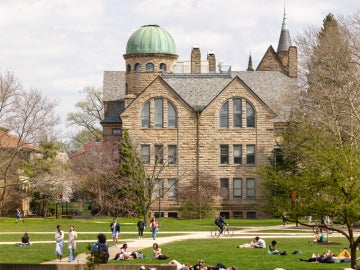Jennifer Fraser Receives Grant from the National Endowment of Humanities
May 21, 2020
Amanda Nagy

Associate Professor of Ethnomusicology and Anthropology Jennifer Fraser has received a summer stipend from the National Endowment of Humanities.
Photo credit: Jennifer Manna
Jennifer Fraser, associate professor of ethnomusicology and anthropology, has received a summer stipend award from the National Endowment of Humanities (NEH) to produce a multimedia website that shares ethnomusicological knowledge of the musical and sociocultural features of saluang, a West Sumatran vocal genre.
The project, Song in the Sumatran Highlands, is Fraser’s first digital humanities work, though it is a continuation of scholarship that she has pursued since her first exposure to the genre as an exchange student in West Sumatra in 1998. Fraser says the project reimagines the ways ethnomusicologists share research and moves us closer to the sensorial worlds of performance. With the $6,000 grant, she is building an interactive website rich in multimedia, explanatory and interpretive text, annotated song texts, visualizations, and maps in order to model the sonic, visual, and spatial epistemologies of saluang.
“It will map, for example, the sonic manifestations of place through tagging song titles, landmarks referenced in song texts, performers, and performances with geospatial metadata,” Fraser says. “Key to the design of the project is representing ethnomusicological knowledge in formats more accessible to the public, including the later creation of a parallel site in Indonesian. This grant will allow me to construct the structural and technical scaffolding of the site, including creating pages for each song, performer, and place.”
Saluang is the pre-eminent vocal tradition of the Minangkabau people. The tradition is centered in the highlands of the contemporary Indonesian province of West Sumatra. It is named saluang for the flute that accompanies the two to three vocalists, who sing late at night and into the early hours of the morning, Fraser explains.
“There are hundreds of songs in the repertoire. Programs are not set in advance as attendees may request their favorite songs at a performance, meaning performers need to know them all,” she says. “The other cool thing about saluang is that the texts are not fixed with a song. Vocalists choose their texts on the spot, from a series of memorized verses, or create them anew in response to the performance context, in rhyming verse nonetheless. Each performance of a song is unique.”

This grant supports the first phase of what Fraser describes as “a longer book-length digital project,” for which she will be on research leave for the 2020-2021 academic year. She has already begun work with Megan Mitchell, academic engagement and digital initiatives coordinator, on conceptualizing the design of the website and choosing the right platform.
“This summer I am focused on the infrastructure and building the scaffolding in Scalar, which has building blocks called pages. I anticipate having thousands of pages by the time I am done. I will hire a student assistant at different points in the project, including this summer.”
Fraser notes that the project is responsive to the community and her collaborators in West Sumatra.
“It is my hope that they will help contribute raw content, including photographs and interpretations of song texts. Eventually, once the whole thing is built, I will copy the site and work on translating it into Indonesian so that it is accessible to people in the saluang community.”
This is Fraser’s first NEH award, and she is thrilled to be recognized and supported for her vision.
“Ethnomusicologists are just starting to experiment with digital platforms for sharing research, even though our work is so multimedia heavy. Nobody has done anything quite like what I am proposing, which moves beyond conventional narrative structures simply shifted online.”

You may also like…
Oberlin Launches Critical AI Studies Minor in Fall 2026
With a solid foundation in both science and the humanities, this minor ensures students to understand and be able to analyze the ethical, cultural, environmental, political, economic, technological, and labor effects of AI.
Chudi Martin Jr. ’24 Earns Prestigious Gates Cambridge Scholarship
Chudi Martin Jr. ’24 earns prestigious Gates Cambridge Scholarship.
Oberlin Opera Theater Presents “Later the Same Evening and Bastianello”: A Double Bill Where Romance Meets the Ridiculous
Oberlin Opera Theater’s spring production features two one-act operas with music by John Musto and librettos by Mark Campbell.


